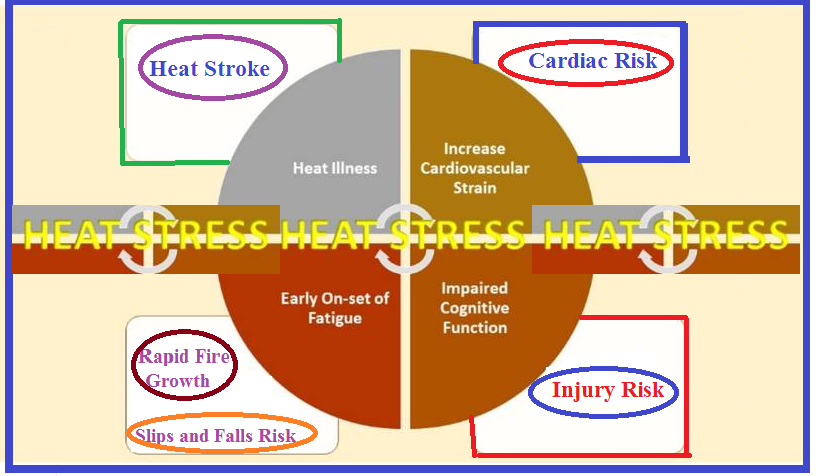Volume 10, Issue 3 (8-2020)
J Health Saf Work 2020, 10(3): 251-262 |
Back to browse issues page
Download citation:
BibTeX | RIS | EndNote | Medlars | ProCite | Reference Manager | RefWorks
Send citation to:



BibTeX | RIS | EndNote | Medlars | ProCite | Reference Manager | RefWorks
Send citation to:
Abbasi M, Pourhossein M, Mohammadi H, Golbabaei F. A review on the effect of heat stresses on cognitive functions. J Health Saf Work 2020; 10 (3) :251-262
URL: http://jhsw.tums.ac.ir/article-1-6372-en.html
URL: http://jhsw.tums.ac.ir/article-1-6372-en.html
1- Department of Occupational Health Engineering, School of public health, Tehran University of Medical Sciences, Tehran, Iran
2- Department of Occupational Health Engineering, School of public health, Tehran University of Medical Sciences, Tehran, Iran ,fgolbabaei@tums.ac.ir
2- Department of Occupational Health Engineering, School of public health, Tehran University of Medical Sciences, Tehran, Iran ,
Abstract: (3304 Views)
Introduction: Many studies have been carried out on the effects of heat stress on cognitive functions, but the results are contradictory. Therefore, this study was conducted to review the effect of heat stress on cognitive functions.
Material and method: In this study, all English articles conducted on effect of heat stress on cognitive, perceptual, and psychomotor functions from 1970 to 2018 were reviewed. For this, articles with keywords such as heat strain, heat stress, cognitive function, memory, comprehension, psychomotor, reaction time, mental performance, mood, mental response, error, task performance, fatigue, alertness, hyperthermia, and heat exhaustion in the Scopus, Web of Science, Science Direct, Pub Med, Springer, Wiley Online Library and ProQuest databases were searched. Out of 157 retrieved articles, 39 articles were finally reviewed according to the inclusion criteria.
Results: Out of 157 retrieved articles related to the topic, according to the inclusion criteria, 39 articles were finally considered for review. Among this articles, 9 (%23) articles were published before 2000 and 30 (%77) after 2000. Two articles were in athletes, four articles (%10.2) in workers, four articles (%10.2) in students, four articles (%10.2) in military soldiers and twenty-five articles (%64.2) were conducted in ordinary people.Based on the results, heat stress was identified as a detrimental factor for decreased cognitive functions such as reading comprehension, memory, focus, mathematical processing, tracking test, reaction time, perception and decoding text and numeric messages, visual alertness, mental computing, text reading , hidden figures test and verbal fluency.
Conclusion: Based on the results of these studies, heat stress has been introduced as a detrimental factor for disrupting cognitive functions, but conclusion based on the results of studies is a systematic method is difficult because many confounding variables such as type of work, exposure time, skill and adaptation plays a big role.
Material and method: In this study, all English articles conducted on effect of heat stress on cognitive, perceptual, and psychomotor functions from 1970 to 2018 were reviewed. For this, articles with keywords such as heat strain, heat stress, cognitive function, memory, comprehension, psychomotor, reaction time, mental performance, mood, mental response, error, task performance, fatigue, alertness, hyperthermia, and heat exhaustion in the Scopus, Web of Science, Science Direct, Pub Med, Springer, Wiley Online Library and ProQuest databases were searched. Out of 157 retrieved articles, 39 articles were finally reviewed according to the inclusion criteria.
Results: Out of 157 retrieved articles related to the topic, according to the inclusion criteria, 39 articles were finally considered for review. Among this articles, 9 (%23) articles were published before 2000 and 30 (%77) after 2000. Two articles were in athletes, four articles (%10.2) in workers, four articles (%10.2) in students, four articles (%10.2) in military soldiers and twenty-five articles (%64.2) were conducted in ordinary people.Based on the results, heat stress was identified as a detrimental factor for decreased cognitive functions such as reading comprehension, memory, focus, mathematical processing, tracking test, reaction time, perception and decoding text and numeric messages, visual alertness, mental computing, text reading , hidden figures test and verbal fluency.
Conclusion: Based on the results of these studies, heat stress has been introduced as a detrimental factor for disrupting cognitive functions, but conclusion based on the results of studies is a systematic method is difficult because many confounding variables such as type of work, exposure time, skill and adaptation plays a big role.
Type of Study: Research |
Received: 2020/09/15 | Accepted: 2020/08/31 | Published: 2020/08/31
Received: 2020/09/15 | Accepted: 2020/08/31 | Published: 2020/08/31
Send email to the article author
| Rights and permissions | |
 |
This work is licensed under a Creative Commons Attribution-NonCommercial 4.0 International License. |






